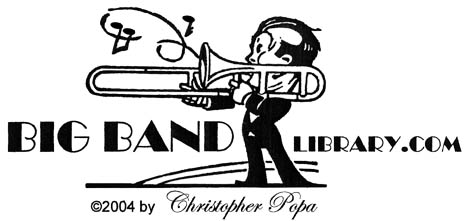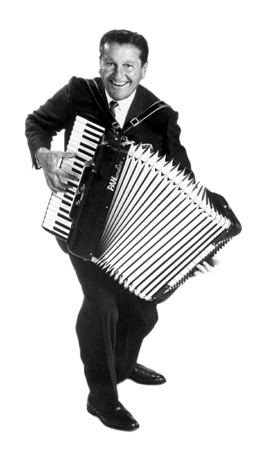
vital stats:
given name Lawrence Leroy Welk
birth Mar. 11, 1903, Strasburg, ND
death May 17, 1992, Santa Monica, CA, pneumonia
ancestry German
father Ludwig Welk, a blacksmith and farmer
mother Christina Schwahn Welk
brother Anton, d. at age 2
brother John, b.Jul. 3, 1893?, d.Sept. 1975?
sister Barbara, b.Apr. 19, 1901?, d.Mar. 1984?
sister Ann Mary
brother Louis
sister Agatha
brother Mike, b.Aug. 21, 1905?, d.Sept. 1983?
sister Eva
education school in Strasburg, ND run by Ursuline nuns
wife Fern Renner, a nursing student, m.Apr. 19, 1931, d.Feb. 13, 2002
daughter Shirley Jean Fredricks, b.Apr. 28, 1932
daughter Donna Lee Mack, b.Feb. 13, 1937
son Lawrence Leroy Welk, Jr., b.Mar. 1940
hobbies swimming, golf
residence 1311 Ashland, River Forest, IL [ 1942 ]; 1299 Ocean Ave., Santa Monica, CA
[ 1981 ]
memberships Local 693, American Federation of Musicians, Huron, SD; Local 10, American
Federation of Musicians, Chicago, IL [ 1942- ]; ASCAP, 1950-
In 1927, Welk formed his own first band, his "Hotsy Totsy Boys," described as "The Biggest Little Band in America." Even though they struggled for a long time, he was able to develop his skills at entertaining and pleasing an audience.
By the time they were booked into the William Penn Hotel in Pittsburgh for New Year's Eve 1938, and had a chance to be heard on the Mutual radio network, Welk's music had taken on a different character. When listeners remarked how "sparkling" and "effervescent" it was, that's when the tagline "Lawrence Welk and His Champagne Music" was adopted.
Ironically, that sound came about by accident: Welk hadn't always been able to hire good musicians, so the arrangements were written simply, short and sweet, with no notes that had to be held too long.
With this new identity, there came other changes.
A tune Welk had written, You're My Home Sweet Home, was played more upbeat and re-named Bubbles in the Wine and became his theme song.
To carry the "champagne" theme ever further, at the beginning of each performance, he would "turn on the bubble machine" and make the sound of a cork popping.
And his female vocalist was nicknamed his "Champagne Lady."
In 1940, Welk's band was booked for a 12-week engagement at the Trianon Ballroom in Chicago; it turned into 9 years of steady employment!
Lawrence Welk - In His Own Words: Ah-One
"I had the extreme good fortune of meeting a man named George T. Kelly, who hired me to
perform in his theatrical troupe, The Peerless Entertainers. It was the luckiest thing that ever
happened to me, because George T. Kelly changed my life . . . by first treating me as if I were an
individual, fully worthy of his time and attention. Then by constantly encouraging me to do better . . .
and complimenting me when I did."
"... the Big Bands actually grew out of the little ones that sprang up in the twenties . . . the ones
I used to listen on the radio. And in those very early days those little bands were fiercely
competitive. The musicians used to practice by the hour to improve themselves. They didn't worry
about money. They just wanted to make themselves and their bands better and better . . . "
"I didn't want to talk, to emcee, because I was always conscious of my accent."
Welk's band played all kinds of songs. To name just a very few associated with him: Beer Barrell Polka, Say It with Music, Corn Silk, Calcutta (a million-seller), I Left My Heart in San Francisco (with a vocal by Jimmy Roberts), Winchester Cathedral, and a great show closer, Adios, Au Revoir, Auf Wiedersehn.
When the band went on a tour to the West Coast in 1951, they discovered a new medium, television (or perhaps it should be said that television discovered them). A broadcast on KTLA-TV in Los Angeles to promote an appearance at a ballroom in nearby Santa Monica brought terrific viewer response.
On July 16, 1955, the ABC Television Network began carrying "The Lawrence Welk Show" coast-to-coast on Saturday evenings and that lasted 16 years!
"Champagne music puts the girl back in the boy's arms - where she belongs," Welk stated.
During that run, many fine musicians played in his band, including George Thow, Art Depew, Dick Catchcart, and Mickey McMahon, trumpets; Barney Liddell, Jimmy Henderson, and Bob Havens, trombones; Pete Fountain, Peanuts Hucko, or Henry Cuesta, clarinets; Dick Dale, Russ Klein, Mahlon Clark, Dave Edwards, and Skeets Herfurt, saxophones; Bob Smale, piano; Bob Ralston, organ; Dick Maloof, bass; and Johnny Klein, drums.
There was also a whole slew of vocalists including Jimmy Roberts, Norma Zimmer, the Lennon Sisters, and Ken Delo. George Cates was musical director and Myron Floren served as assistant conductor and accordionist. Among Welk's arrangers were Joe Haymes, Richard Maltby, Jack Pleis, and Bob Ballard.
Curiously, Welk's very first recording was titled Spiked Beer, done for the Gennett label in 1928.
Throughout the years, he recorded for a variety of labels, including Vocalion and Okeh (1938-40), then to Decca and, later, Coral.
Around 1959, he began a decade with Dot, and proceeded to make many albums, such as "Dance with Lawrence Welk," "Lawrence in Dixieland," "Double Shuffle," "Lawrence Welk & Johnny Hodges," and "Lawrence Welk Swings the Classics."
He then signed with Ranwood and continued recording into the early 1980s.
Welk had dozens of achievements and awards during his career, including winning countless popularity polls, playing Madison Square Garden in New York City in 1956, being invited to perform at President Dwight Eisenhower's inaugural ball in January 1957, and serving as the Grand Marshal for the Rose Bowl's Tournament of Roses Parade in 1972.
A reporter once asked him what the most enjoyable experience of it all had been and Welk described an evening at Harrah's in Lake Tahoe, probably from the late 1960s.
"Everything worked perfect. It was a good night: the singers were in voice, the musicians were playing beautifully," he enthused. "After introducing a number I pull back and stand at the side. Then it hits you: to watch it all work, the whole thing you built over the years. To listen how good they sound, see how happy they are, to watch their faces go past as they move in and out of backstage . . . "
Unexpectedly, in 1971, ABC decided that Welk's audience was too old, too rural, and too sedate and dropped his TV program from their schedule.
Lawrence Welk - In His Own Words: Ah-Two
"I never heard anything from ABC. No phone call, no letter, nothing . . . Big business has no feelings."
"To this day I am staggered at the thought that more than a million people took the time to write.
And I truly believe that it was those letters-combined with the phone calls-that made the difference
for us. All those people standing up and demanding to be counted are what kept our show on the air."
"I'll agree that changing musical styles and various union demands . . . including a major strike . . .
all played a part in ending the Big Bands. But I'm convinced that what actually brought it about
was the attitude of some of the musicians themselves. They stopped playing the kind of music
their fans wanted to hear, and when they did, the crowds stopped coming."
"Money doesn't interest me that much. What am I worth? I don't know. They tell me 15-16 million
dollars. I never did know. Other people handle all that."
Never one to give up, after being cut by ABC, he signed up more than 250 independent TV stations across the United States and Canada and was able to remain on television and keep making new shows for 11 more years.
Welk's business interests included ownership of the royalty rights to 20,000 songs, including Jerome Kern's copyrights, which he bought for $3.2 million in 1970, and a 1,000-acre resort and retirement complex, Lawrence Welk Village, in Escondido, CA.
PBS began running reruns of Welk's TV programs in 1987, and even into the first part of the 21st Century, the shows (with new introductory segments) continued to reach an audience of more than 3 million households - outnumbering those for MTV, VH1, and BET.
It seemed that Welk's fans regarded his show as a constant in a changing world, that it reminded them of a simpler, happier time.
He himself loved wholesome, good entertainment. No wonder that he often commented after a song, "wunnerful, wunnerful!"
sources:
Harriet Choice, "Welk's forever blowing bubbles . . . and staying afloat," Chicago Tribune,
Aug. 24, 1975, p.F12.
Peter B. Flint, "Lawrence Welk, the TV Maestro Of Champagne Music, Dies at 89,"
New York Times, May 19, 1992, p.B8.
George Gent, "Welk Show Among 11 Programs Dropped From A.B.C. Fall Slate,"
New York Times, Mar. 20, 1971, p.59, col.2.
Susan Katz, The Lawrence Welk Scrapbook (New York City: Grosset & Dunlap Publishers,
1978).
John Leland, "Old Fans and PBS Still Bubble to Lawrence Welk," New York Times, Sept.
10, 2004.
Ken Michaels, "Mr. Wonderful-Wonderful," Chicago Tribune, Oct. 3, 1971, p.J44.
William K. Schwienher, Lawrence Welk: An American Institution (Chicago, IL: Nelson-Hall,
1980).
Social Security Death Index.
"Welk, Lawrence," in ASCAP Biographical Dictionary, Fourth Edition (New York City: R.R.
Bowker Company, 1980), p.536.
Lawrence Welk with Bernice McGeehan, Ah-One, Ah-Two!: Life with My Musical Family
(Englewood Cliffs, NJ: Prentice-Hall Inc., 1974).
---, Lawrence Welk's Musical Family Album (Englewood Cliffs, NJ: Prentice-Hall Inc., 1977).
---, My America, Your America (Englewood Cliffs, NJ: Prentice-Hall, Inc., 1976).
Larry Wolters, "He Serves Champagne Hot!: Lawrence Welk's Bubbling Rhythms Delight
Millions, but Musical Eggheads Call Him Cornball," Chicago Daily Tribune, Apr. 28,
1957, p.C24.
I would like to expand this tribute with, if possible, a new interview of someone who was important to Lawrence Welk's life or career. Are you an alumnus of his band, a member of his family, or a collector who is knowledgeable about his accomplishments? Please contact me via e-mail
return to "Biographical Sketches" directory
go to Big Band Library homepage
The big bands are back
in a new and exciting way!
LAWRENCE WELK
"FAMILY VALUES"
by Music Librarian CHRISTOPHER POPA
September 2009
He rose from an immigrant family which believed in hard work, thrift, and discipline.
He dropped out of the fourth grade to work on his father's farm, agreeing to stick around until he was 21 and pay back the money which his dad had spent to buy him an accordion.
Eventually, Welk's band, which he considered his "musical family," was the featured attraction on what became one of the longest-running shows in television history. In fact, he reportedly was the second-wealthiest performer in show business (topped only by comedian Bob Hope), and that TV program was the second-biggest tourist draw to Los Angeles, right behind Disneyland.
His orchestra most famously played songs "light" and "bubbly," and their style was known as "champagne music."
"You have to play what the people understand," he once explained. "Keep it simple so the audience can feel like they can do it too."
